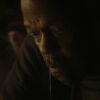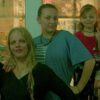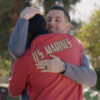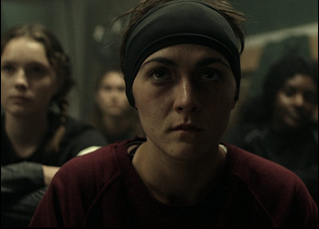No one could know at the time, but as “Justice League” was doing its original round of reshoots in the summer of 2017, another superhero origin story was taking shape away from the cameras as Lauren Hadaway began to write about her experiences as a competitive rower. Parked in a tiny recording booth for months on end as an ADR supervisor outside a blimp factory in England being used as a soundstage where she can recall Jason Momoa’s head nearly hitting the ceiling as he came in to re-record lines of dialogue, Hadaway, during her downtime, let her mind wander back to when she was out on the water for SMU, writing down memories as diligently as she once took down notes on the best angles to take, putting as much power behind her pen as an oar.
“I was just sitting in this dark trailer all by myself and didn’t know what to do and the script just came out of me over the course of three weeks,” Hadaway says now. “When I was in England, I actually went rowing with a random team, just to get back into it and [the film] flowed out of me. I think I was just ready. It was simmering for so long I was just ready to write it.”
That explosiveness can be felt throughout “The Novice,” one of the most impressive and exhilarating feature debuts in recent memory, which should move Hadaway off of being under consideration for the sound departments of blockbusters to directing them. Muscular and intense, the film is bound to turn heads when it premieres this weekend at the Tribeca Film Festival, working one over completely with the determination it shares with its lead character Alex Dahl (Isabelle Fuhrman), a freshman who doesn’t want to waste any time on the JV squad. Hadaway shrewdly declines to offer reasons for Alex’s obsessive drive, with the only relevant fact being that it’s all-consuming when rowing becomes her identity at the expense of everything else. Others around her, from a friend from high school (Jeni Ross), a teammate (Amy Forsyth) and a teacher’s assistant who takes a romantic interest in her (Dilone), show their concern, but the only voice she’ll listen to is the one in her head telling her she’s never working hard enough, putting her heart into a sport that will never reciprocate in kind, no matter how successful she is at it.
Brilliantly designed as a most tortured romance, Hadaway underscores “The Novice” with old love songs to hear the ache in straining vocals and sex scenes are there to reveal bruises, with the hold it has on Alex understood by how gripping it is for an audience to experience. On the eve of the premiere of the film, which will be available virtually across the U.S. through June 23rd following its physical bow in New York on June 13th, the writer/director spoke about navigating choppy waters quite literally to make such a tour de force.
I come from a career in post-production sound, so before this, I was working mostly in dialogue and ADR supervising, which is the unsexiest job that no one’s ever heard of, but it’s actually really cool. ADR is where they come in after the film to rerecord lines for noise or they need to change the dialogue for a scene or they need to explain something that a test audience doesn’t understand, so my job was, among many other things, was to go into a room and sit in a room with the actors and with the directors — so many of my heroes from when I grew up as a little redneck kid in Texas — and watching them work. Directors are busy people and everyone hates ADR, so sometimes it was me in the room with the actor to get what the film needs.
I wanted to be a director when I was a kid, but then I went to college and was really hit with imposter syndrome, but it was really being in the room with these people time and time again and realizing that I could do it that I decided after reaching career milestones in sound, I was ready to tell my own stories. I was a rower, and it was a traumatic and very obsessive four years for me. It was my whole life. My team thought I was psychotic. I know this now because I’m still friends and talk to some of them, but I thought I was normal. I thought everyone thought this way about it, so I wrote “The Novice,” inspired by my own years and it was cathartic for me. I ended up sending the script out to a producer that I knew from college actually and slowly it snowballed over the course of two years. I basically just said I want to be a writer/director and I started.
That’s kind of perfect for what this film is when all you need to know about this character is her drive, not necessarily what drives her – was that a tough sell getting that kind of character through the system?
Yeah, there was a point in time where we were loosely attached to these other producers and they were trying to push the script in a more traditional direction. I tried to do these rewrites and the script started going down this rabbit hole of becoming every other sports [movie]. I love a good sports movie, but this to me is a movie with sports. It’s different. And it just felt really forced and it was tough. A question I have gotten a lot is why? What drives Alex Dall? Why is she doing this? And it has frustrated me at times. The question is why not? You only live once and this movie is really my existentialist anthem. Existentialism is for me is that life has no meaning. You create your own meaning. I find meaning in challenges and drive and creating things and doing things and being out of my element and Alex does too, she was inspired by me. She’s my 10 years of coming of age and my four years of rowing, so I did have to stick with my guns.
In terms of editing, the first 15 minutes have always been an issue. I edited it and we brought on Nathan Nugent, who came on for five weeks and really helped us crack the beginning. For a while, we were in this gray zone of we don’t know who she is and why she’s doing this, so we’re trying to push it to explain it and we’re like, you know what? Fuck that. Instead of going and trying to explain this and give something that isn’t there, let’s go the opposite direction. Let’s push it even further away and let’s make it even weirder, so she basically doesn’t talk for the first 10, 15 minutes of the movie. That was a conscious choice by me and Nathan and we cut out the dialogue that did exist there and we wanted the audience to feel like they’re watching her and wondering who she is, so when she finally speaks and you finally see her personality, it’s like an unraveling. She’s a bit of a mystery and an enigma.
I just love how you don’t know her name in the beginning and the assistant coach doesn’t, so when she says it, it feels like she’s asserting herself as much into her own story as to being on the team. Something else that was extraordinarily distinctive is the film’s soundtrack — did you have those ‘60s love songs in mind from the start?
Yeah,the first song that hit would’ve been in 2018. I tend to be someone who listens to one song on loop for eight hours at a time for six weeks at a time and I heard this song by Connie Francis, “Al Di La,” which is in the film, and I had this whole image hit me in my head suddenly while I was driving of like a foggy row [out on the water alone], this beautiful love scene of rowing and what you see in the film is what was in my head. I remember the day that I signed the option with the producers, and we were walking down Santa Monica, and I’m like, “What if we play this in the scene?” Props to the producers for totally letting me do that.
I made a Spotify playlist and started adding all these ‘60s songs and just started marinating on them. All these other sequences came about because for me, this film isn’t a rowing film. It’s a love story between Alex and a boat and a sport, and rowing is a beautiful sport, but it’s not inherently cinematic because you’re doing the same thing over and over, so the challenge for me became how do you make the audience connected to a sport that they don’t understand. Every rowing scene is a different moment in this love story from the clunky beginnings and the attraction to the first time making love and the first fight to the being in love to the toxic breakup and the songs just really became the focal point for that.
You making rowing cinematic with how immersive this is with those scenes on the water, and I know you made a short, “Row,” as a proof-of-concept. Did you learn anything there for how you could film this?
“Row,” I don’t even know that I would call it a short because it didn’t premiere at any festivals, but I wanted to play with drones because shooting on the water is a nightmare and I was curious with what drones could do, so it’s only three minutes long and I was reaffirmed it was going to be extremely difficult, but the actress in that film did a thing during that short that actually becomes the opening shot of “The Novice.” It was a moment where she was tired and we were just shooting things with a drone and I was just telling her to do whatever. She just leaned back on the boat and looked up at the sky and I was like, “Holy fuck, that’s the shot.” It’s in the [feature] a couple of times, that perspective of being one with the water and looking up at the sky.
And I come from the sound world, so I don’t understand about cameras, but my DP Todd [Martin] knows his stuff and he and I just had this Pisces-Virgo connection. [laughs] And he knows his stuff and he really just directed the fuck out of the cinematography. I’d just tell him these things that I wanted every morning and we’d sit down and draw out little stick figures for exactly what we needed for the water shots and he just made it happen. There was such trust.
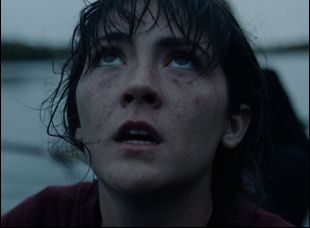
As many indies go, there were a lot of false starts and stops, and we had somebody else attached who we lost when we got greenlit, so we didn’t have a lead anymore and we did this casting call. [Isabelle’s] audition came in, and there was a scene that all these actresses were doing – the pool hall scene [where Alex is getting to know Dani for one of her classes] and half the people were sort of misreading it. There was a nuance to it, and she just got it. She got the character and she wrote me this letter about how she ran from Los Angeles to Las Vegas one time and when we met in real life, she shows up with this binder and these tabs and this energy and she embodied Alex.
And when I first met her, I was shocked because if you’ve heard of Isabelle probably know her from “Orphan” where she was this little serial killer child, and you meet her in real life and she’s not that. She is peppy and full of energy, and in hindsight, I’m so glad that we had her and had that because the shoot was so hard. The first week was on the water and we were shooting in Ontario at night and [there was] 40-mile-an-hour wind, so the city opened a dam and boats were getting sucked down, and [there was] lightning and accidents [around], but when you have a lead who’s in every shot of the film who has this energy, drive and obsession, that was contagious. It really made a difference, not just on a creative level of the film, but with the crew and rallying the troops.
Besides bad weather, was there anything that may have been unexpected that you could embrace?
I’m certain there are. You find these magical things and try to work them into the script, like the location, for instance, we scouted every rowing boathouse in a two-mile radius outside of Toronto and this location was nothing like I had imagined or expected. But when we get there, it’s literally in the middle of nowhere and it feels like Southern Gothic [with] this 1960s brutalist architecture and I think the guy who designed it was literally on a hill, doing acid and designing this nuclear bunker school. It’s a bizarre place, so building that into the script and leaning into the creepy, we made the setting a character and then Dilone, who plays Dani, the love interest, she did something in the audition [where] she stood up on a chair and I was like, “Holy fuck, I’m writing that into the script.” That happened so often I can’t think of [just] one.
The Alex Weston score is marvelous, both elegant and churning to reflect a grind that gets to something smooth – how did you come to work with him?
Alex was a discovery too because the score was the one thing about the film I never had a clear idea about. I knew how everything else would look and sound, but when I was editing it, I was having a crisis about this and my pandemic hobby was driving. One day I only put on French music [in the car] because I was in the process of learning French, but I was sick of listening to it, so I put on this playlist from “Portrait of a Lady on Fire,” which had other score songs on it and a track from “The Farewell” came on from Alex Weston’s score and it was completely opposite of what music I had in the film at that moment. But just like [hearing] “Al Di La,” I had this idea and I was driving up the Angeles Crest trail of mountains next to L.A., I immediately turned my car around, ran home and changed all the music out [to a temp score from [his music] for “The Farewell” and some other songs we had done. I wrote this really impassioned e-mail [to him] being like, “The score I discovered just happened and suddenly everything’s clicking. I need you to come on and I need you to score this film.” He did and it’s fucking great.
What’s it like getting to the finish line?
I am so ready for people to see it. I understand now directors say make sure you find a project that you’re ready to spend two years of your life on because it’s a child – I wrote the first draft in July of 2017 and went through the whole process, and was really involved because of my background [in post], and birthed it, so it’s been a labor of love and I’m really proud of it. All these different moments that clicked – the crew, the producers, getting Alex Weston to come on for the score. And fuck it, I’m ready. I’m ready to go to New York and I’m probably going to be socially inept and not know how to talk to people because I’ve been holed up for a year, just like everyone else, but I’m just so ready.
“The Novice” opens on December 17th at the Quad Cinema in New York and the Nuart Theater in Los Angeles where Lauren Hadaway and Isabelle Fuhrman will appear for post-screening Q & As after the 7:30 pm show on the 17th and 18th. The film is also available on digital and demand.
